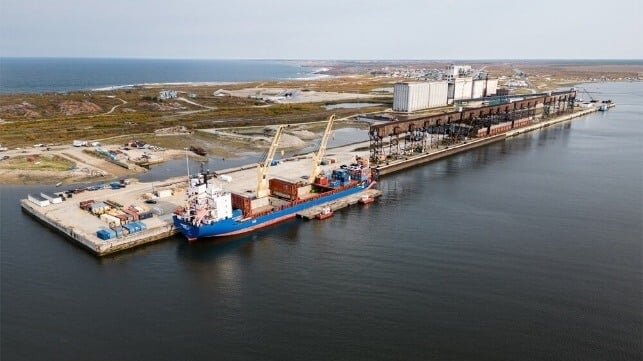The Rising Importance of the Port of Churchill in Canada’s Trade Landscape
The Port of Churchill, situated in Manitoba within the Arctic region, is gaining significance in Canada’s trade discussions. As the country faces trade disputes with the United States and explores new opportunities in the oil and gas sector, this once overlooked port is now at the forefront of attention.
Two decades ago, Manitoba ministers along with the federal Minister for Western Economic Diversification initiated plans to expand the port. In 2005, a C$2 million investment was announced, supplemented by an additional C$1 million from the Hudson Bay Railway Company for port development. The focus was on enhancing containerized traffic flow and facilitating the movement of heavy machinery, fertilizer, and ores.
Managed by the Arctic Gateway Group, an Indigenous- and community-owned corporation, the Port of Churchill stands out as Canada’s sole Arctic deepwater seaport linked by rail through the Hudson Bay Railway. With four deep-sea berths and storage facilities, the port serves as a crucial trade hub, especially due to its rail connectivity.
Situated on the west coast of Hudson Bay, the port offers shorter shipping routes to Europe and serves as a vital connection for local Arctic communities. In light of Canada’s strained relations with the U.S., Churchill’s strategic importance has been reemphasized.
New Opportunities and Potential
Energy Minister Tim Hodgson highlighted Churchill’s potential, citing its geographic similarities to Oslo and dismissing concerns about icebound conditions with Canada’s forthcoming icebreaker fleet. The port’s adaptability for natural resource exports like gas and potash is increasingly recognized.
Canada’s entry into the LNG market, with a new export terminal in British Columbia, positions Churchill favorably for Asian markets and potentially European gas imports. Proposals for west-east pipelines and Ontario’s refinery plans further underscore Churchill’s role as a strategic trade terminus.
Future Prospects and Investments
The Canadian government’s recent call for pipeline feasibility studies and Manitoba’s budgetary allocations for port development signify growing confidence in Churchill’s trade potential. Arctic Gateway Group’s CEO, Chris Avery, envisions the port as a key player in Canada’s trade and security landscape, emphasizing the modernization of rail infrastructure.
With increased demand for critical minerals and diversified agricultural trade partnerships, the Port of Churchill is poised to drive economic growth in Canada’s northern regions, offering job opportunities and strengthening supply chains.

